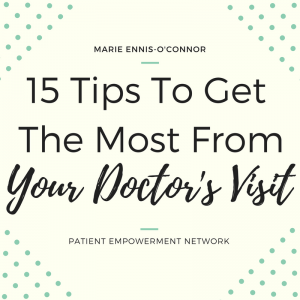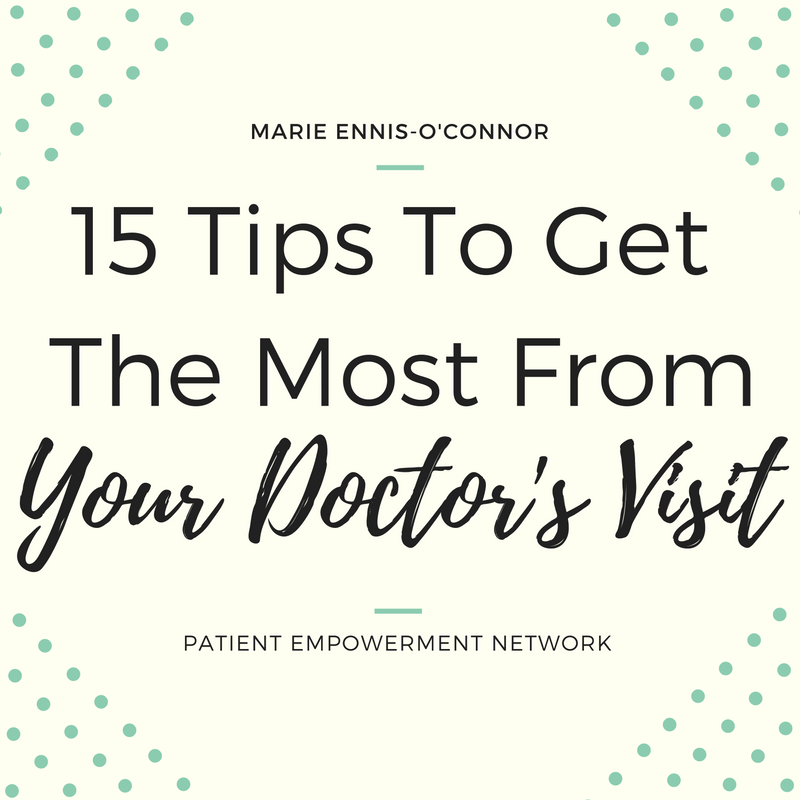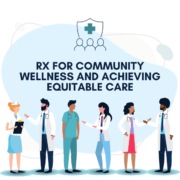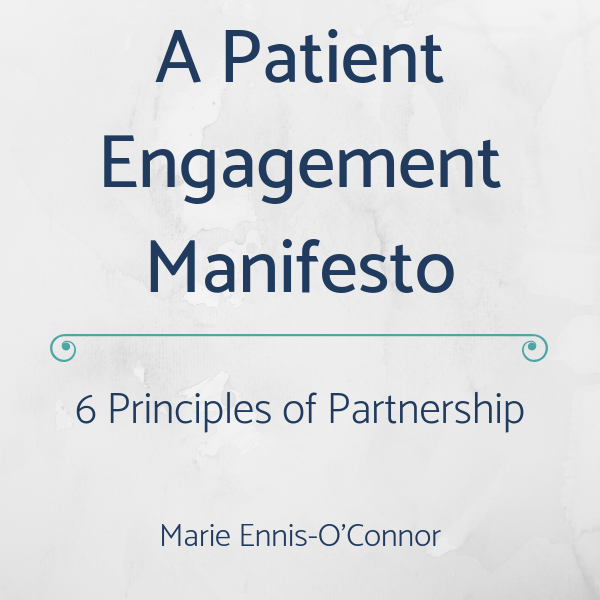15 Tips To Get the Most From Your Doctor’s Visit
 Have you ever had the experience of leaving the doctor’s office wishing you had remembered to ask a certain question? Or have you left it until the very end to tell your doctor about the real reason for your visit? These so-called “doorknob” questions – bringing up an important concern just as you are leaving the office – can mean your doctor won’t have time to adequately address your concerns. When the average time it takes for a doctor’s visit is fifteen minutes, it’s easy to feel rushed and forget what you wanted to say, or to leave an appointment unsure of the information you have heard. But with a little advance preparation you can learn how to make the most of those fifteen minutes. Follow these fifteen tips to become a more empowered and engaged partner in your own health – and the health of those you care for.
Have you ever had the experience of leaving the doctor’s office wishing you had remembered to ask a certain question? Or have you left it until the very end to tell your doctor about the real reason for your visit? These so-called “doorknob” questions – bringing up an important concern just as you are leaving the office – can mean your doctor won’t have time to adequately address your concerns. When the average time it takes for a doctor’s visit is fifteen minutes, it’s easy to feel rushed and forget what you wanted to say, or to leave an appointment unsure of the information you have heard. But with a little advance preparation you can learn how to make the most of those fifteen minutes. Follow these fifteen tips to become a more empowered and engaged partner in your own health – and the health of those you care for.
1. When you call to make your appointment, explain clearly why you need to see the doctor. Let the receptionist know how much time you will need to schedule for the visit. If you have any special needs, such as wheelchair access or interpretive needs, let the office know in advance.
2. Be sure to that where you make your appointment accepts your insurance. You can call or go online to your insurance website to see a directory of in-network providers.
3. If this is your first visit to a new physician, gather together any past medical records and family medical history to take along with you. If you’re seeing other doctors and have information they’ve provided, bring this along too.
4. Write down a list of your symptoms before the visit. It’s a good idea to keep a diary so you can chart your symptoms over time. Include details of the type of symptoms you are experiencing, when these symptoms began, and what makes them better or worse.
Use this common medical mnemonic to guide you.
(O)-P-Q-R-S-T
- Pain (“Where does it hurt?”)
- Quality (“What does it feel like?”)
- Radiation (“Does it move anywhere?”)
- Scale (“How bad is it? How much does it affect you?”)
- Timing (“When did it start? How long does it last? Does it come and go? Is it gradual or sudden in onset? What makes it better or worse?”)
- Other (“Any other symptoms?”)
5. Set the agenda at the start of your visit. Did you know that a patient has an average of 23 seconds to state their concerns before a physician interrupts? According to an article published in The Journal of the American Medical Association, only 28% of doctors know their patient’s full spectrum of concerns before they begin to focus on one particular concern, and once the conversation is focused, the likelihood of returning to other concerns is only 8%. Doctors have a limited amount of time for office visits. In order to use their time wisely they usually set the agenda and control the visit as much as possible. To avoid this happening to you, prepare in advance the top two or three concerns you want to raise with your doctor. Are you looking for a diagnosis? Do you need a new treatment plan or a modification of an existing plan? Are you looking for help with feelings of fatigue or depression? Don’t forget to describe your emotional state and any personal circumstances which may influence your physical health. Write down your main concerns so you are ready to verbalize them clearly at the beginning of your visit.
6. If you use a self-tracking device, like a Fitbit, download your data and summarize the findings beforehand.
7. Bring a list of all medications you are currently taking, including over-the-counter medications, vitamins, herbs, or supplements. If you have a smart phone or tablet, it’s useful to take pictures of your medication and supplement labels to show the doctor.
8. During your visit, tell your doctor you would like to take notes. If you would prefer to record your notes via your smartphone, ask your doctor if it is ok to do so.
9. Medical care is a conversation. So to have influence in that conversation you have to speak up. If you don’t want the treatment your doctor recommends (or you’re not sure), it’s reasonable to ask if there are other treatment options available. Never be embarrassed to tell your doctor if you don’t understand something she has said. Sometimes doctors use medical jargon without realizing they are not explaining things in terms we understand. Repeat what the doctor has told you to be sure you understand and ask for clarification if needed
10. If you find it difficult to speak up for yourself, or you are facing a potentially challenging diagnosis, bring a friend or family member along for support. This person can also take notes and help you remember what was discussed later.
11. Always be honest with your doctor. You may not like to admit how much you drink, or smoke, or if you have stopped taking your medication because of expense or side effects, but your doctor needs to know about these and other lifestyle matters to ensure you are receiving optimum care.
12. Ask you doctor to explain any test results to you, Request a copy of the results for your own files.
13. Before you leave, be sure you understand what needs to happen next. Do you need any further diagnostic tests? When will you get the results? If you have just received a diagnosis, what are your treatment options? If you have questions or concerns later how should you contact your doctor? You can also ask if your doctor recommends any specific reading materials or websites about your condition.
14. If you have been given a prescription for a new medication, do you understand how and when the medication should be taken? Are there any side-effects, for example drowsiness, you should watch for? How will you know if the medication is working? What happens if you miss a dose?
15. After your visit, review and file your notes along with any test results or other documentation and billing you received. Schedule any follow up tests or appointments right away.
Your relationship with your doctor is one of the most important you have. Advance preparation will help you use your own time and your doctor’s time more efficiently and effectively. When people take an active role in their care, research shows they are more satisfied and do better in how well treatments work. Preparing for your doctor’s visit is an important step toward becoming a partner in your own health care and a better advocate for your health and well-being.

A Stanford Medicine X e-Patient scholar, Marie Ennis O’Connor is an internationally recognized keynote speaker, writer, and consultant on global trends in patient engagement, digital health and participatory medicine. Marie’s work is informed by her passion for embedding the patient voice at the heart of healthcare values. She writes about the experience of transitioning from breast cancer patient to advocate on her award-winning blog Journeying Beyond Breast Cancer.










